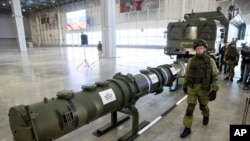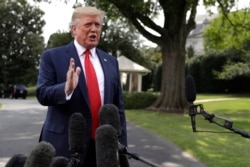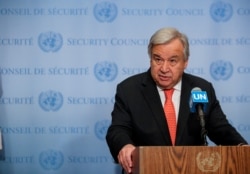Updated at 5:26 p.m. Aug. 2.
VOA's Margaret Besheer at the United Nations contributed to this report.
The United States on Friday pulled out of the Intermediate Range Nuclear Forces (INF) treaty to develop its own new missiles after the Russians refused to destroy their new missiles NATO says violate the pact.
“Russia failed to return to full and verified compliance through the destruction of its noncompliant missile system, the SSC-8 or 9M729 ground-launched, intermediate-range cruise missile,” said Secretary of State Mike Pompeo. “Russia is solely responsible for the treaty’s demise.”
Pompeo, in a statement, added the United States “will not remain party to a treaty that is deliberately violated by Russia. Russia’s noncompliance under the treaty jeopardizes U.S. supreme interests as Russia’s development and fielding of a treaty-violating missile system represents a direct threat to the United States and our allies and partners.”
Secretary of Defense Mark Esper said the withdrawal would allow the United States to develop its own new conventional missiles. "Now that we have withdrawn, the Department of Defense will fully pursue the development of these ground-launched conventional missiles as a prudent response to Russia's actions," he said in a statement.
'In the lead'
When asked about abandoning the INF treaty, President Donald Trump told reporters Friday on the White House South Lawn that Russia wasn't living up to its commitments and we "always need to be in the lead."
He said he is hopeful a new agreement can be made to replace the historic Cold War pact, and said such a deal could include China, but also said, "We have new nuclear [weapons] coming."
Trump said Thursday, in response to a question from VOA, "Russia would like to do something on a nuclear treaty and that's OK with me. They would like to do something and so would I."
In his statement, Pompeo called on Russia and China “to join us in this opportunity to deliver real security results to our nations and the entire world.”
A ‘brake on nuclear war’
With the expiration of the treaty, the world loses “an invaluable brake on nuclear war,” United Nations Secretary-General Antonio Guterres told reporters Thursday. “This will likely heighten, not reduce, the threat posed by ballistic missiles."
U.S. officials for months have complained that Russia turned a deaf ear to pleas from officials here and in Europe to halt its violations of the treaty.
Russian officials claim they have strictly observed the treaty’s provision and have not allowed violations.
Russian President Vladimir Putin a month ago signed legislation suspending his country's participation in the treaty, five months after the Trump administration made a similar move.
The pact has been a pillar of European security for more than 30 years. It bans the development and deployment of ground-launched nuclear missiles with ranges between 500 and 5,500 kilometers (310 and 3,400 miles). European leaders, fearing a renewed arms race if the treaty is jettisoned, called on Washington and Moscow to remain constructively engaged to try to preserve it.
Measured response
Polish Foreign Minister Jacek Czaputowicz said Friday that Poland blamed Moscow for the treaty's demise, but agreed with NATO that the response to Russia's actions should be measured.
NATO has called for a defensive package of measures to deter Russia, but NATO Secretary-General Jens Stoltenberg said it would involve only conventional weapons and that "there would be no rash moves" by the alliance.
There is also concern about the ramifications beyond Europe.
“The prospect of new ground-based INF systems being introduced in Asia could conceivably spark similar political turmoil among Asian allies,” says Laura Kennedy, a former U.S. ambassador to Turkmenistan and former U.S. permanent representative to the Conference on Disarmament in Geneva.
“Even if the U.S. planned only to field such future systems on U.S.-territory such as Guam, such a move could be seen as threatening by China, which could respond by introducing a new wave of systems as a counter,” Kennedy, an adviser to Foreign Policy for America, told VOA.
“We are literally years away before we would be at a point where we would talk about basing of any particular capability,” says a senior administration official, downplaying such immediate concerns.
The 1987 INF agreement was signed by U.S. President Ronald Reagan and Soviet leader Mikhail Gorbachev. It eliminated the medium-range missiles arsenals of the two countries and went into effect in June of the following year.








